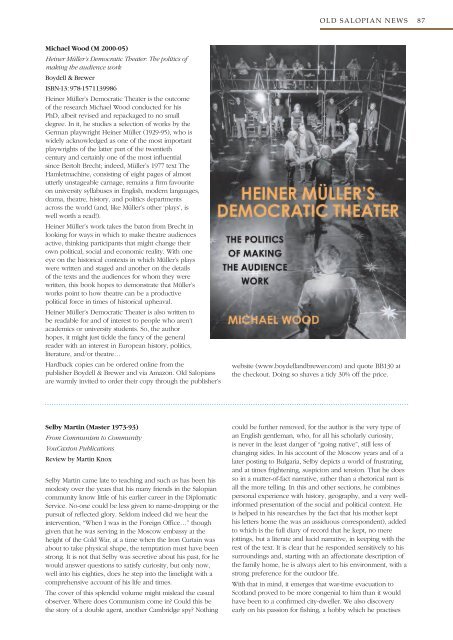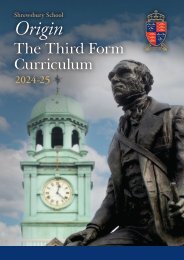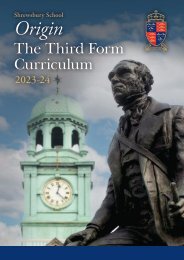The Salopian no. 160 - Summer 2017
- No tags were found...
Create successful ePaper yourself
Turn your PDF publications into a flip-book with our unique Google optimized e-Paper software.
OLD SALOPIAN NEWS 87<br />
Michael Wood (M 2000-05)<br />
Heiner Müller’s Democratic <strong>The</strong>ater: <strong>The</strong> politics of<br />
making the audience work<br />
Boydell & Brewer<br />
ISBN-13: 978-1571139986<br />
Heiner Müller’s Democratic <strong>The</strong>ater is the outcome<br />
of the research Michael Wood conducted for his<br />
PhD, albeit revised and repackaged to <strong>no</strong> small<br />
degree. In it, he studies a selection of works by the<br />
German playwright Heiner Müller (1929-95), who is<br />
widely ack<strong>no</strong>wledged as one of the most important<br />
playwrights of the latter part of the twentieth<br />
century and certainly one of the most influential<br />
since Bertolt Brecht; indeed, Müller’s 1977 text <strong>The</strong><br />
Hamletmachine, consisting of eight pages of almost<br />
utterly unstageable carnage, remains a firm favourite<br />
on university syllabuses in English, modern languages,<br />
drama, theatre, history, and politics departments<br />
across the world (and, like Müller’s other ‘plays’, is<br />
well worth a read!).<br />
Heiner Müller’s work takes the baton from Brecht in<br />
looking for ways in which to make theatre audiences<br />
active, thinking participants that might change their<br />
own political, social and eco<strong>no</strong>mic reality. With one<br />
eye on the historical contexts in which Müller’s plays<br />
were written and staged and a<strong>no</strong>ther on the details<br />
of the texts and the audiences for whom they were<br />
written, this book hopes to demonstrate that Müller’s<br />
works point to how theatre can be a productive<br />
political force in times of historical upheaval.<br />
Heiner Müller’s Democratic <strong>The</strong>ater is also written to<br />
be readable for and of interest to people who aren’t<br />
academics or university students. So, the author<br />
hopes, it might just tickle the fancy of the general<br />
reader with an interest in European history, politics,<br />
literature, and/or theatre…<br />
Hardback copies can be ordered online from the<br />
publisher Boydell & Brewer and via Amazon. Old <strong>Salopian</strong>s<br />
are warmly invited to order their copy through the publisher’s<br />
website (www.boydellandbrewer.com) and quote BB130 at<br />
the checkout. Doing so shaves a tidy 30% off the price.<br />
Selby Martin (Master 1973-93)<br />
From Communism to Community<br />
YouCaxton Publications<br />
Review by Martin K<strong>no</strong>x<br />
Selby Martin came late to teaching and such as has been his<br />
modesty over the years that his many friends in the <strong>Salopian</strong><br />
community k<strong>no</strong>w little of his earlier career in the Diplomatic<br />
Service. No-one could be less given to name-dropping or the<br />
pursuit of reflected glory. Seldom indeed did we hear the<br />
intervention, “When I was in the Foreign Office…” though<br />
given that he was serving in the Moscow embassy at the<br />
height of the Cold War, at a time when the Iron Curtain was<br />
about to take physical shape, the temptation must have been<br />
strong. It is <strong>no</strong>t that Selby was secretive about his past, for he<br />
would answer questions to satisfy curiosity, but only <strong>no</strong>w,<br />
well into his eighties, does he step into the limelight with a<br />
comprehensive account of his life and times.<br />
<strong>The</strong> cover of this splendid volume might mislead the casual<br />
observer. Where does Communism come in? Could this be<br />
the story of a double agent, a<strong>no</strong>ther Cambridge spy? Nothing<br />
could be further removed, for the author is the very type of<br />
an English gentleman, who, for all his scholarly curiosity,<br />
is never in the least danger of “going native”, still less of<br />
changing sides. In his account of the Moscow years and of a<br />
later posting to Bulgaria, Selby depicts a world of frustrating,<br />
and at times frightening, suspicion and tension. That he does<br />
so in a matter-of-fact narrative, rather than a rhetorical rant is<br />
all the more telling. In this and other sections, he combines<br />
personal experience with history, geography, and a very wellinformed<br />
presentation of the social and political context. He<br />
is helped in his researches by the fact that his mother kept<br />
his letters home (he was an assiduous correspondent), added<br />
to which is the full diary of record that he kept, <strong>no</strong> mere<br />
jottings, but a literate and lucid narrative, in keeping with the<br />
rest of the text. It is clear that he responded sensitively to his<br />
surroundings and, starting with an affectionate description of<br />
the family home, he is always alert to his environment, with a<br />
strong preference for the outdoor life.<br />
With that in mind, it emerges that war-time evacuation to<br />
Scotland proved to be more congenial to him than it would<br />
have been to a confirmed city-dweller. We also discovery<br />
early on his passion for fishing, a hobby which he practises

















